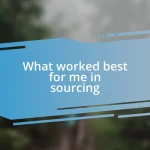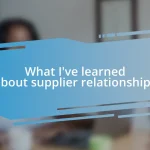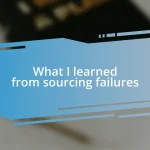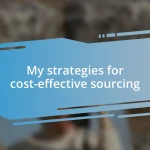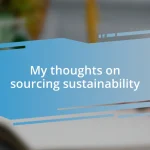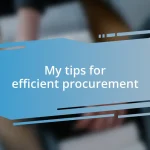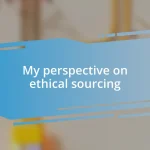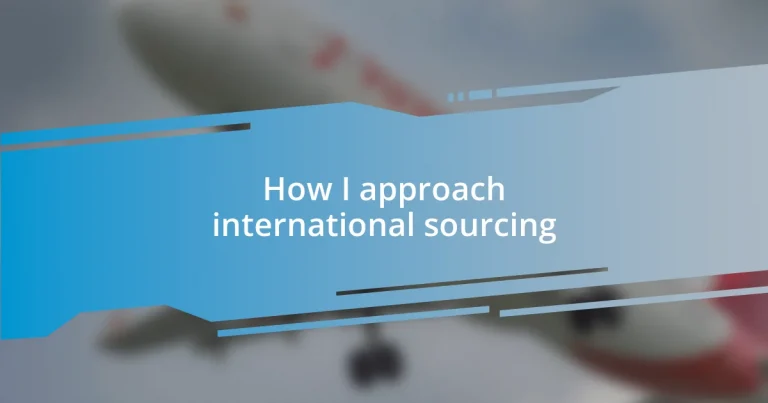Key takeaways:
- Understanding cultural differences and regulatory environments is essential for successful international sourcing and supplier negotiations.
- Effective evaluation of suppliers should focus on transparency, technological capabilities, and scalability to ensure reliability and quality.
- Building long-term supplier relationships requires consistent communication, empathy in addressing challenges, and a commitment to mutual success.
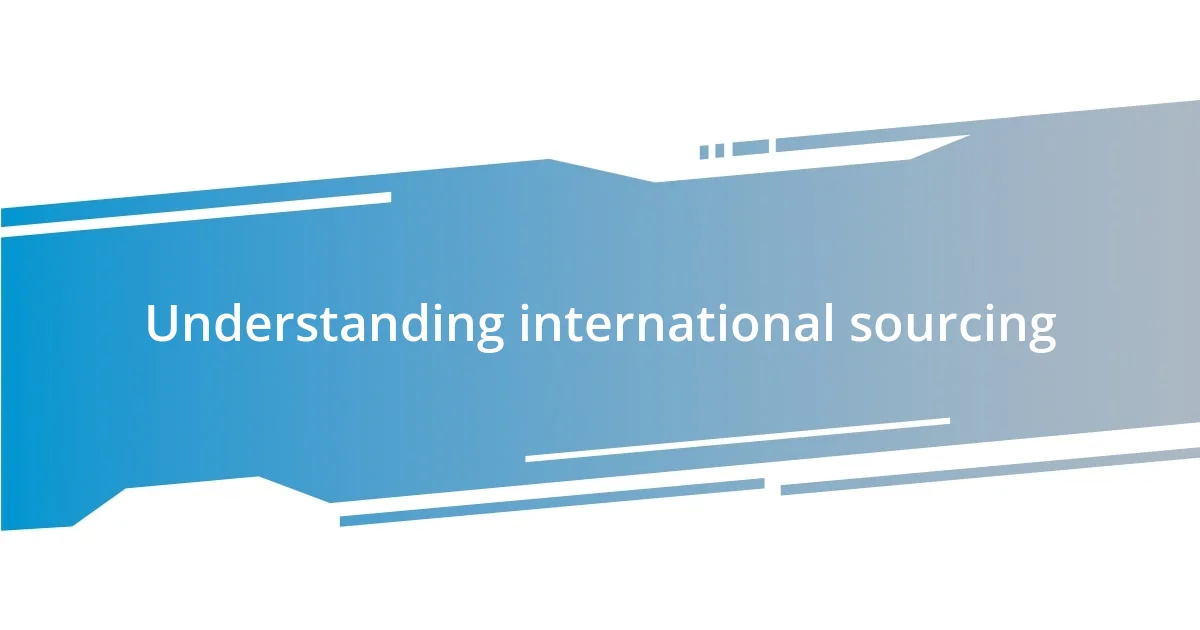
Understanding international sourcing
International sourcing is the practice of procuring goods or services from outside one’s home country, which can greatly broaden a company’s supply chain options. I remember the first time I ventured into this realm—I felt a blend of excitement and apprehension, knowing that I was entering a vast, unfamiliar market. Have you ever considered how the choices I made in selecting suppliers could impact not only costs but also quality and reliability?
As I delved deeper into international sourcing, I learned that cultural differences can profoundly affect communication and negotiation. I once misinterpreted the urgency of a supplier’s response because I was unaware of their local holidays. This experience taught me the importance of understanding the nuances of different business cultures. How do you ensure you’re on the same page with international partners?
Navigating regulatory environments is another crucial aspect of international sourcing that can’t be overlooked. I vividly recall grappling with tariffs and import regulations during a project where compliance was paramount. It can feel daunting, but I found that staying organized and informed were my best allies. How do you approach the complexities of compliance when sourcing from abroad?
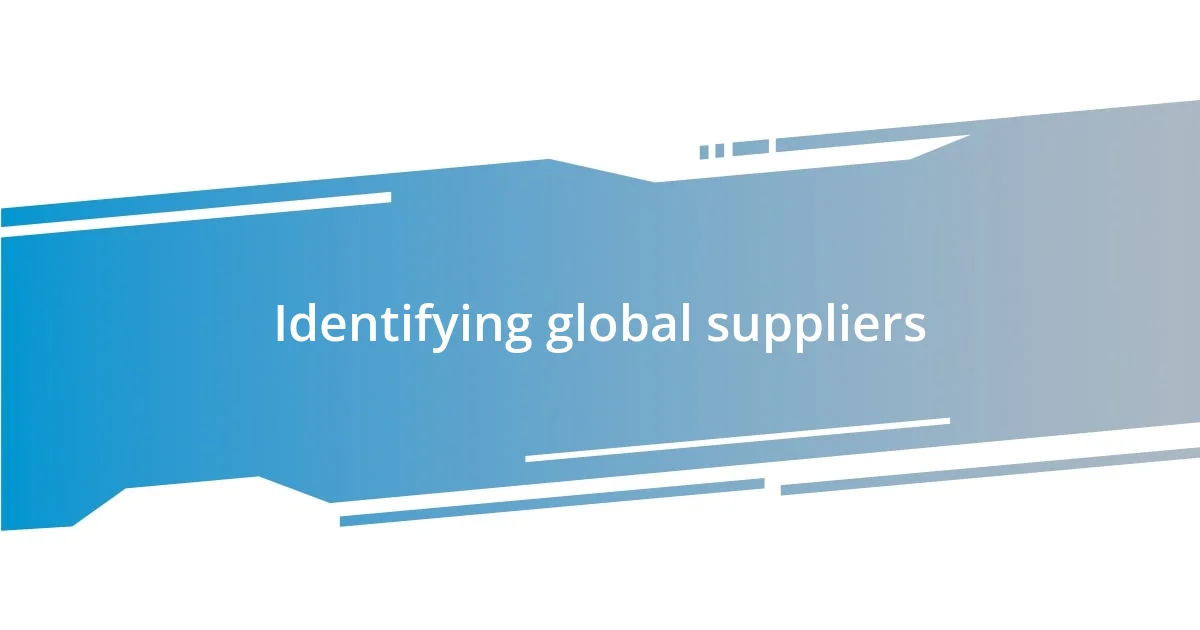
Identifying global suppliers
Identifying global suppliers can be both exhilarating and challenging. I remember the thrill of my first search; it felt like embarking on a treasure hunt for the best partners across continents. Each potential supplier offered a unique mix of advantages and risks, and I learned quickly that initial impressions could be deceptive.
Here are some strategies that helped me in the process:
- Research Marketplaces: I often started my search on platforms like Alibaba or Global Sources, providing a broad spectrum of suppliers at my fingertips.
- Leverage Industry Networks: Engaging with fellow professionals through trade shows and online forums has unearthed many leads that I wouldn’t have found otherwise.
- Evaluate Financial Stability: I always assess potential partners’ financial health, as this can be a strong indicator of reliability.
- Seek Local Expertise: Sometimes, I consulted local experts or agencies that understood the regional dynamics and could help vet suppliers effectively.
This process is essential; after all, the right supplier can become a pivotal ally in my business journey, while the wrong choice could lead to headaches down the line.
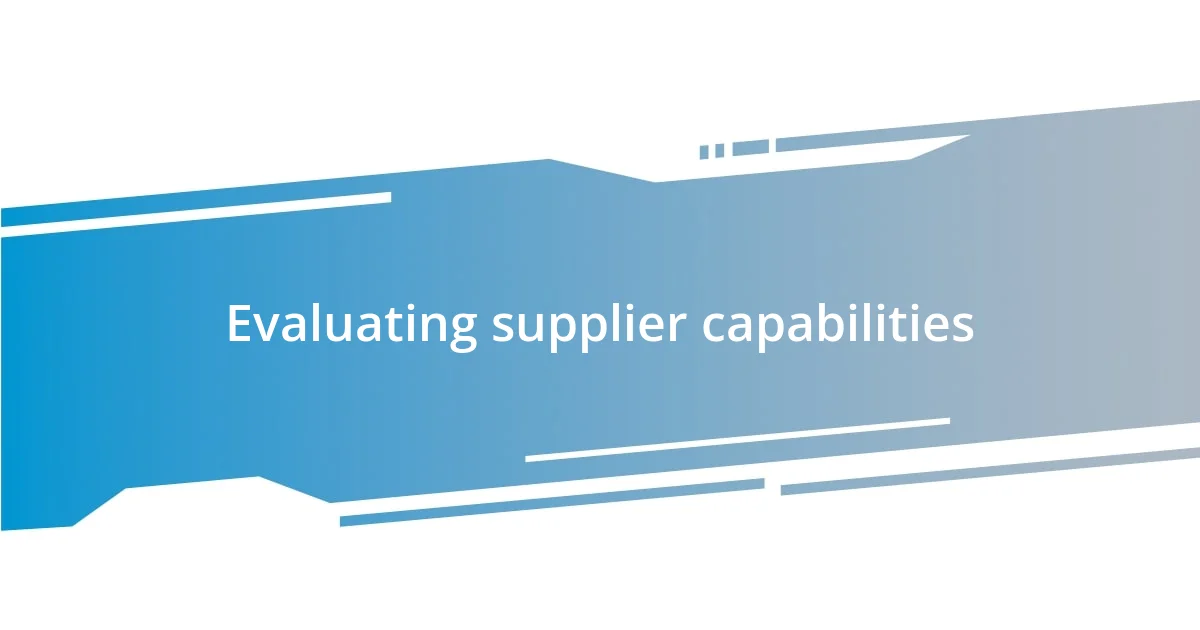
Evaluating supplier capabilities
When evaluating supplier capabilities, I prioritize transparency and communication right from the start. In my experience, a supplier who shares their processes and metrics openly is often more trustworthy. One time, I was impressed by a supplier who provided detailed production timelines and quality control measures. This not only gave me confidence but also established a strong foundation for collaboration. How do you gauge transparency when assessing potential partners?
Assessing a supplier’s technological capabilities can also be a game-changer. I once worked with a manufacturer that leveraged advanced robotics, significantly improving their consistency and output. This experience made it clear to me that investing in technology often translates to higher quality products. Have you considered how a supplier’s tech prowess could impact your business?
Finally, the concept of scalability cannot be overlooked. I vividly recall partnering with a supplier who could only meet initial demand but struggled when my order volumes increased. This taught me the crucial lesson to evaluate a supplier’s ability to grow alongside my business. How do you determine if a supplier can scale their operations effectively?
| Criteria | Importance |
|---|---|
| Transparency | Builds trust and ensures alignment |
| Technological Capabilities | Directly impacts product quality and efficiency |
| Scalability | Essential for meeting growing demand |
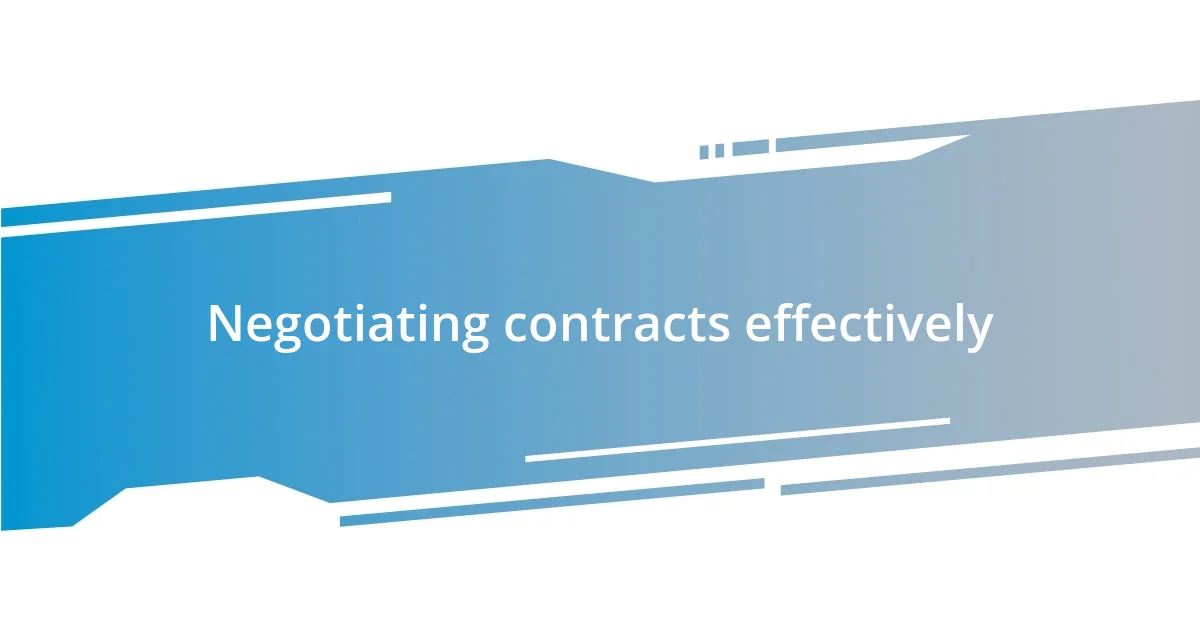
Negotiating contracts effectively
When it comes to negotiating contracts effectively, I find that preparation is key. I always come armed with data and benchmarks, which empowers me to advocate for the best terms. For instance, during a recent negotiation, I presented comparative pricing based on market research I had conducted, and it not only bolstered my position but also led to a more favorable agreement. Have you ever felt underprepared in a negotiation? That feeling can be nerve-wracking, but it’s one I strive to avoid.
Another vital aspect is understanding the cultural nuances involved in negotiations. I recall negotiating with a supplier in Asia and realizing that direct communication wasn’t always preferred. Instead, I adopted a more collaborative approach, carefully choosing my wording to foster mutual respect. This shift in strategy resulted in a solid partnership and an agreement that benefited both parties. Have you considered how cultural differences might affect your negotiations?
It’s also crucial to maintain a balance between being assertive and empathetic. I experienced this firsthand when closing a deal that involved a supplier facing production delays. Instead of pushing them too hard, I listened to their challenges, which ultimately led to a solution that worked for both of us. The result? A contract that reflected understanding and flexibility, which set the stage for a strong working relationship. How do you strike that balance in your negotiations?
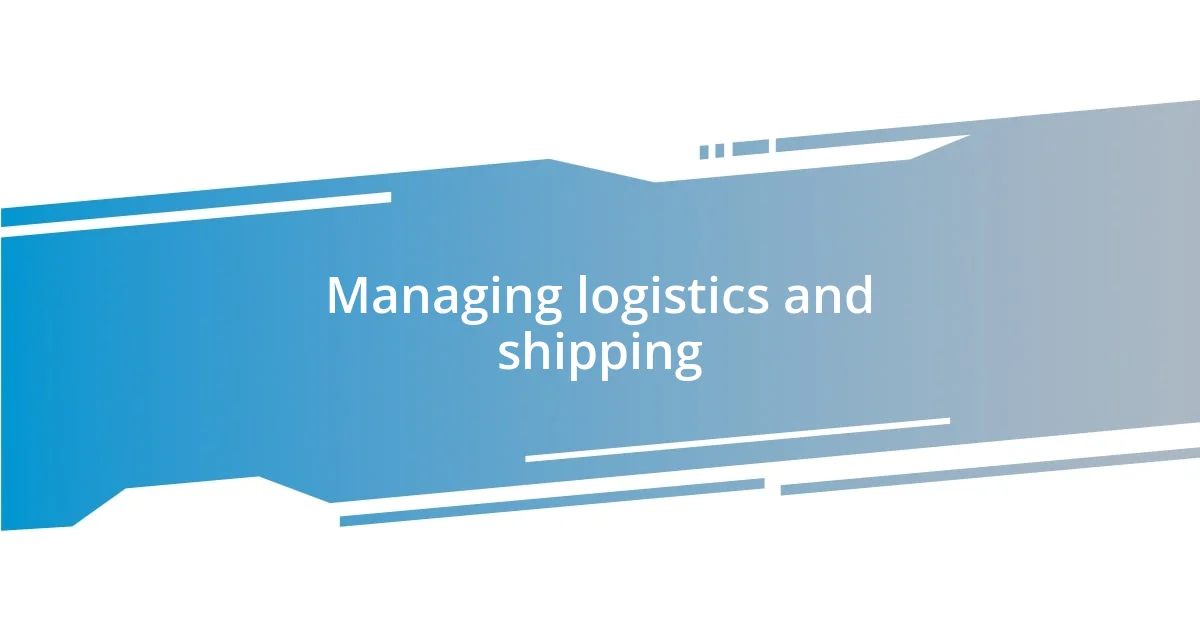
Managing logistics and shipping
Managing logistics and shipping can often feel like navigating a complex maze, but I’ve learned that clear planning makes all the difference. I remember a time when I underestimated shipping timelines, leading to last-minute scrambles. Now, I use detailed logistics software to track shipments and anticipate any potential delays. Wouldn’t it make your life easier to have that peace of mind?
One aspect I never overlook is customs documentation. Early in my career, I encountered major headaches due to incomplete paperwork, causing unnecessary delays and extra costs. I now ensure that all necessary documents are prepared well in advance, which not only smooths the process but also fosters better relationships with customs officials. How much more smoothly would your operations run with proper documentation in place?
Communication also plays a critical role in managing logistics. I’ve found that having regular check-ins with shipping partners helps mitigate issues before they escalate. For instance, a quick weekly call can reveal potential challenges, allowing us to strategize together. Do you have systems in place to keep communication fluid with your logistics partners?
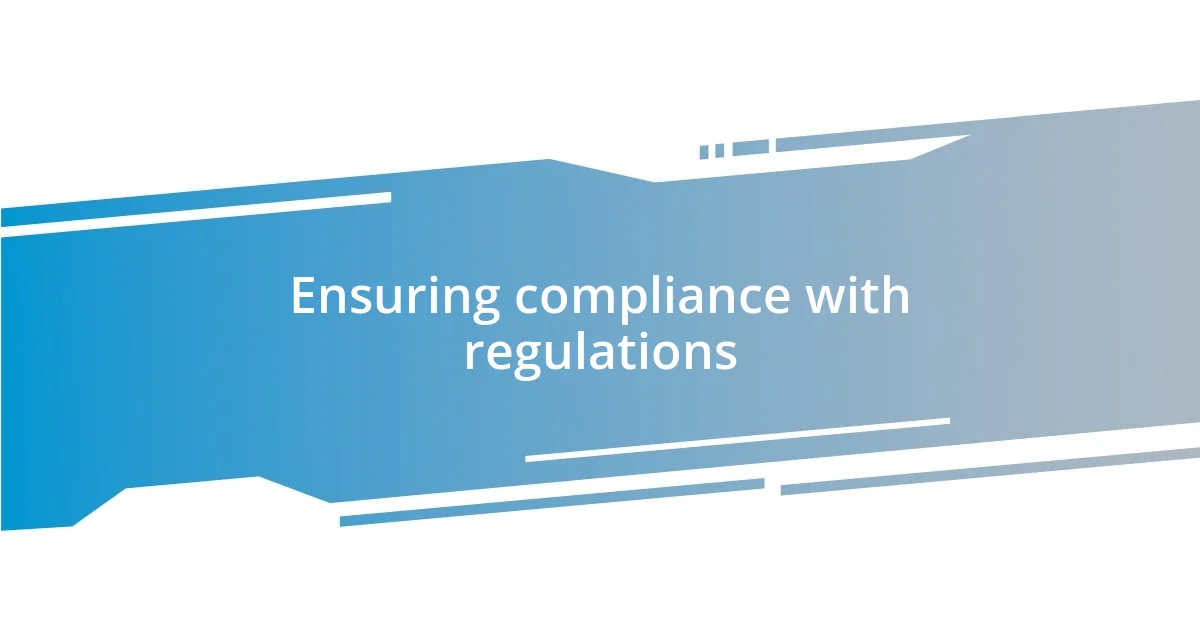
Ensuring compliance with regulations
Ensuring compliance with regulations is a non-negotiable aspect of my sourcing strategy. I vividly remember the stress of my first international shipment that was halted due to regulatory non-compliance. The experience taught me the importance of familiarizing myself with both local and international laws, which have varied interpretations and implications. Have you ever found yourself caught up in a regulatory web? It can be overwhelming, but I assure you, understanding these requirements is the first step towards smooth operations.
One of my go-to practices is engaging with local legal experts or consultants. I recall seeking advice from a compliance specialist while sourcing from Europe, which was invaluable in avoiding costly mistakes. They helped me navigate complex tariffs and product safety standards, ensuring that my imports met the necessary criteria. This not only saved me from potential fines but also built trust with my partners, who appreciated my commitment to compliance. How often do you consult with experts on regulatory matters? Their insights can be a game-changer.
I also utilize compliance management tools that streamline keeping track of regulations across different regions. For instance, using a software solution equipped with real-time updates on changing laws has transformed how I approach compliance. It catches my attention whenever there’s an update relevant to my sourcing activities, prompting me to adjust my strategy accordingly. Imagine having that level of awareness at your fingertips—how would it change your approach to sourcing?
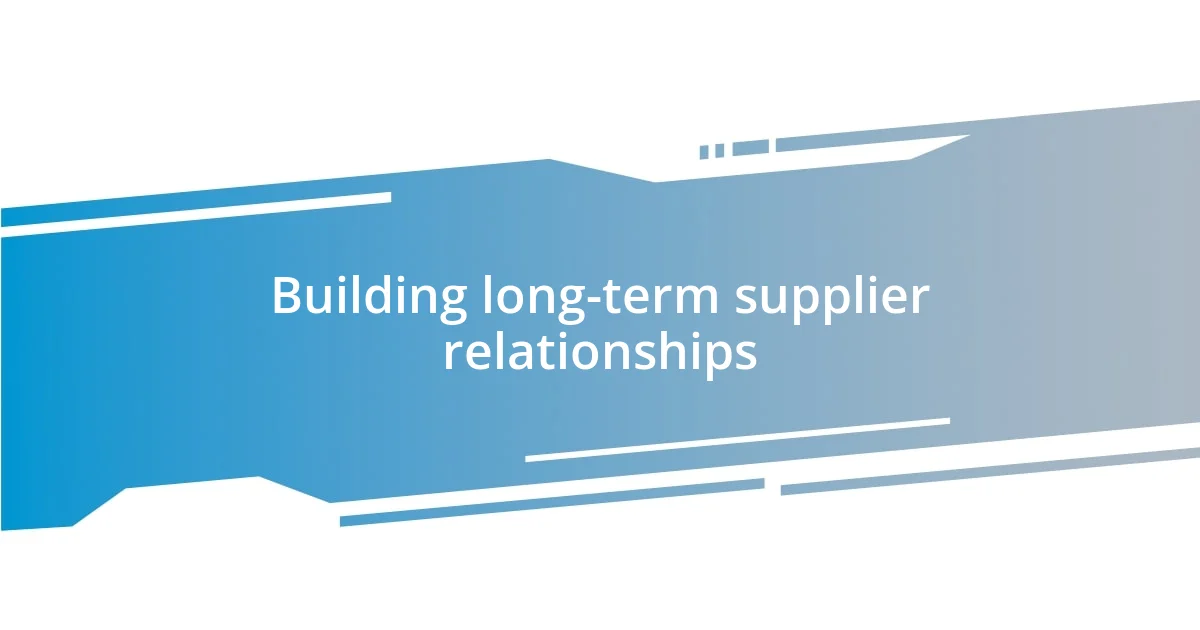
Building long-term supplier relationships
Establishing long-term supplier relationships involves more than just initial agreements; it’s about cultivating trust over time. I recall my first significant partnership with a supplier in Asia. After an early hiccup with product quality, I scheduled a face-to-face meeting, which allowed us to address concerns directly. This personal touch not only resolved issues but also strengthened our collaboration. Have you ever taken the time to meet a supplier in person? Sometimes, a simple conversation can pave the way for a stronger partnership.
Communication is the backbone of any successful supplier relationship. I’ve learned that regular updates, whether through emails or video calls, keep everyone aligned and engaged. A few months back, I implemented a bi-weekly check-in with one of my main suppliers, and it made a world of difference. We now address potential challenges before they arise, and I can’t help but feel a sense of relief knowing we’re both invested in our mutual success. How often do you prioritize these check-ins with your suppliers?
Another key aspect is being transparent and open about expectations. I once worked with a supplier who was delivering products later than promised, and instead of reacting negatively, I opened a dialogue to understand their challenges. It turned out they were facing their own supply chain issues. By empathizing and finding solutions together, we not only resolved the delays but also developed a stronger bond. Have you considered how your willingness to communicate openly could transform your supplier relationships? I believe it’s a crucial piece of the puzzle in building lasting connections.
